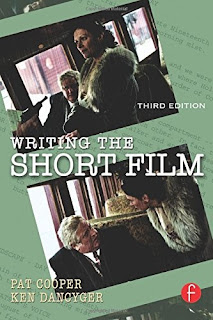Short films are, for many a young and new filmmaker, their first step into the business. Make a few, make a good one, you can generate a little buzz about yourself. Give people an idea of what your tastes and strengths are. However, their brief length can pose a challenge for writers, trained or not. So what could help here?
Back in
2004, screenwriting lecturers Cooper and Dancyger decided to add their
perspective to the world of screenwriting manuals and bibles, but rather
than doing the umpteenth book on features or coming up with another cute name for a three-act reskin, instead tackled the subject of short films. While
still framed with Aristotlean principles and act structure, Cooper and
Dancyger keep their focus small and tight by analysing and diseecting
how the short form tell stories, how to convey information within
limited time and what the differences are between feature and short,
beyond length.
One of the very few screenwriting tomes exclusively about shorts,
and certainly one of the more well known, Cooper and Dancyger deliver a
solid enough guide to how all the fundamentals of film narrative
(dialogue, characterisation, pacing, want vs need, subtext) can be
applied and prepared for the short form, but it is unmistakably the work
of academics. As such, the more bold and colourful among ye may be turned off by it.
Whereas other writing manuals favour a more humourous,
conversational style of writing, designed to ease the aspiring writer in
and create a sort of bond between guru and pupil, the duo write with a
clinical precision and analytical frame of mind. It very much reads like a classroom piece, making the book feel
and read more like a collection of university essays than, necessarily, one writer speaking to
another in a relatable fashion.
This by no means is a big negative, and Cooper
and Dancyger do their best to supply the reader with tools, detailed
maps and means to prepare a short screenplay. They frame most of it around a two act principle (though also concede to one act) using some adaptative exercises, tackling the classic Greek myth of Icarus, as well as scenes from shorts they or their students have been involved with, to illustrate their points. It works decently and it never had me confused. Indeed, some of the best parts come from these segments, where they go through revisions and show you how something changed.
Still, it all feels sterile
and written without enthusiasm, which can leave it a little dry and ponderous at times. It's more instructive than it is motivational or inspirational, which does align it more with the stereotype of screenwriting books. Do not confuse this with implying the
book is sloppy or boring; merely written by observers and analysts of
the craft, teaching classes and engaged in an academic discussion of
film, versus the more impassioned approach of a guru or working
screenwriter of larger projects wanting to share tricks and fun
anecdotes.
On its own merits, Short Film is capably written, well
structured and clearly geared at new film students. Indeed, it reads
like classroom material: thorough, lengthy but always at an intellectual
distance, more a teaching tool than a standalone piece that makes for a
good read in its own right.


No comments:
Post a Comment